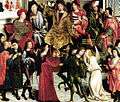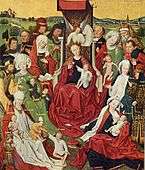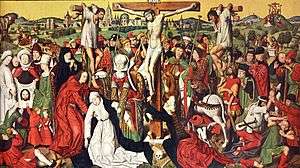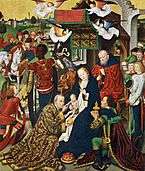Derick Baegert
Derik[1] or Derick Baegert (ca. 1440 - after 1515) was a German late Gothic painter.
Derick Baegert was probably born in Wesel around 1435-1440 to Johan Baegert, a merchant, and Mechtelt Mynreman. While his family wasn't very wealthy, Derick ended his life as one of the richer people of Wesel, living in a grand house on the Brückstrasse in the old town of Wesel.[1] Painter Jan Baegert, in earlier literature named the Master of Cappenberg, was his son, and Jan Joest, who may have been his nephew,[2] and the Master of the Schermbecker Altar were probably some of his pupils.[3]
Apart from some works for the city and churches of Wesel (including the retable for the Mathenachurch, largely destroyed in the Second World War), he also painted large altar pieces for churches like the Propsteichurch in Dortmund, and works for private devotion.[1]
Gallery
 Christ Carrying the Cross and Veronica with the Sudarium, 1477-1478, now in the Thyssen-Bornemisza Museum in Madrid
Christ Carrying the Cross and Veronica with the Sudarium, 1477-1478, now in the Thyssen-Bornemisza Museum in Madrid Knights and Soldiers playing Dice for Christ's Robe, part from the polyptych in the Thyssen-Bornemisza Museum
Knights and Soldiers playing Dice for Christ's Robe, part from the polyptych in the Thyssen-Bornemisza Museum Saint Luke Painting the Virgin, ca. 1470, now in the Westfalisches Landesmuseum, Münster
Saint Luke Painting the Virgin, ca. 1470, now in the Westfalisches Landesmuseum, Münster Oath taking in courtroom, 1493, now in the Städtisches Gallerie im Centrum, Wesel
Oath taking in courtroom, 1493, now in the Städtisches Gallerie im Centrum, Wesel- Washing the hands of Pilatus, now in the Germanisches Nationalmuseum in Nuremberg
Notes
- "Derik Baegert". Wesel. Retrieved 26 November 2013.
- The Jack and Belle Linsky Collection in the Metropolitan Museum of Art. New York: Metropolitan Museum of Art. 1984. p. 67. ISBN 9780870993701.
- From Van Eyck to Bruegel: Early Netherlandish Painting in the Metropolitan Museum of Art. New York: Metropolitan Museum of Art. 1998. p. 396. ISBN 9780870998706.
| Wikimedia Commons has media related to Derick Baegert. |


